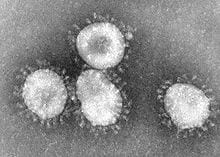
Researchers describe potential for MERS coronavirus to spread internationally after mass gatherings in the Middle East this summer and fall
The life-threatening MERS coronavirus that has emerged in the Middle East could spread faster and wider during two international mass gatherings involving millions of people in the next few months, according to researchers who describe the most likely pathways of international spread based upon worldwide patterns of air travel.
Researchers led by Dr. Kamran Khan of St. Michael’s Hospital encouraged health care providers to learn from the experience of SARS by anticipating rather than reacting to the introduction of MERS in travelers returning from the Middle East. SARS, which was also caused by a previously unknown coronavirus, killed 800 people worldwide a decade ago, including 44 in Toronto, and cost the Canadian economy an estimated $2 billion.
The MERS coronavirus, which appears to have emerged in the Middle East in early 2012, has spread to several countries in Western Europe and North Africa where there have been localized clusters of cases. Worldwide about 80 cases have been confirmed, with a mortality rate of more than 50 per cent.
Dr. Khan said there is potential for the virus to spread faster and wider during two annual events that draw millions of domestic and foreign Muslims to Saudi Arabia. The first is umrah, a pilgrimage that can be performed at any time of year but is considered particularly auspicious during the month of Ramadan, which this year began on July 9 and ends on Aug. 7. The second is the hajj, a five-day pilgrimage required of all physically and financially able Muslims at least once in their life. It takes place Oct. 13-18 this year and is expected to draw more than 3 million people.
Dr. Khan’s team analyzed 2012 worldwide airline traffic and historic hajj data to predict population movements in and out of Saudi Arabia and the broader Middle East during these two mass gatherings to help countries assess their potential for MERS introduction via returning travelers and pilgrims. He also used World Bank economic and per capita health care expenditure data to help gauge individual countries’ abilities to detect imported MERS in a timely manner and mount an effective public health response.
Results of the study were published in the online journal PLoS Currents: Outbreaks.
Dr. Khan, an infectious disease physician, is the founder of BioDiaspora, a web-based technology that uses global air traffic patterns to predict the international spread of infectious disease. The BioDiaspora platform has been used by numerous international agencies, including the U.S. Centers for Disease Control and Prevention, the European Centre for Disease Prevention and Control and the World Health Organization to evaluate emerging infectious disease threats, including those during global mass gatherings such as the Olympics and the hajj.
“With millions of foreign pilgrims set to congregate in Mecca and Medina between Ramadan and the hajj, pilgrims could acquire and subsequently return to their home countries with MERS, either through direct exposure to the as-of-yet unidentified source or through contact with domestic pilgrims who may be infected,” he said.
The Latest Bing News on:
MERS coronavirus
- The WHO updates its terminology for pathogens that transmit through the airon April 25, 2024 at 6:48 pm
The World Health Organization published a consensus statement on airborne pathogens, finally aligning the WHO with scientists who presented evidence of this early in the course of the COVID-19 ...
- What Is Disease X That Can Cause Another Pandemicon April 22, 2024 at 9:51 am
Ebola, Lassa fever, MERS, Nipah and Zika, which have caused widespread fatalities during outbreaks ...
- The pandemic cost 7 million lives, but talks to prevent a repeat stallon April 21, 2024 at 5:00 am
“The trauma of the covid-19 pandemic has seeped into the negotiations,” said Ellen 't Hoen, a lawyer and public health advocate who specializes in intellectual property policies. Representatives of ...
- WHO publishes report on updated terminology for pathogens that transmit through airon April 20, 2024 at 3:52 am
Read more about WHO publishes report on updated terminology for pathogens that transmit through air on Devdiscourse ...
- WHO terms pathogens that transmit through air ‘infectious respiratory particles’ or IRPson April 18, 2024 at 7:59 am
WHO introduces term 'infectious respiratory particles' for pathogens transmitted through the air, ending terminology challenges during pandemics.
- 7 out of 10 American voters think COVID-19 came from a labon April 17, 2024 at 2:06 pm
When asked what theory they support, 69% of American voters said SARS-CoV-2 came from a lab, while only 31% said it emerged naturally, according to the latest Deseret News/HarrisX poll.
- 7 out of 10 Americans think COVID-19 came from a labon April 17, 2024 at 5:00 am
Their rationale wasn’t far-fetched. The two previous coronavirus outbreaks — severe acute respiratory syndrome, or SARS, and Middle East respiratory syndrome — had zoonotic roots. Dr. Anthony Fauci, ...
- COVID 19on April 16, 2024 at 6:14 am
A construction worker struck down by cancer and COVID-19 is mounting a legal campaign after his insurance company refused to honour his lost wages. Insurance 7:22pm Apr 23, 2024 Netherlands man ...
- Chapter 12 - Human Coronaviruses (Including Covid-19, SARS and MERS)on April 10, 2024 at 5:00 pm
To save this book to your Kindle, first ensure [email protected] is added to your Approved Personal Document E-mail List under your Personal Document Settings on the Manage Your Content and ...
- What to know about the timeline and progression of COVID-19 symptomson April 3, 2024 at 5:00 pm
The Frontiers in Public Health study also suggested that COVID-19 could then cause nausea and vomiting, which would develop sooner than it would in similar respiratory infections, such as MERS or ...
The Latest Google Headlines on:
MERS coronavirus
[google_news title=”” keyword=”MERS coronavirus” num_posts=”10″ blurb_length=”0″ show_thumb=”left”]
The Latest Bing News on:
MERS
- EU Parliament Adopts AML Laws Regulating Bitcoin Based On Questionable Assumptionson April 26, 2024 at 9:03 am
On Wednesday, the European Parliament adopted a new AML package increasing crypto asset service provider’s reporting requirements for anonymous payments. But it appears that the package’s crypto laws ...
- The WHO updates its terminology for pathogens that transmit through the airon April 25, 2024 at 6:48 pm
The World Health Organization published a consensus statement on airborne pathogens, finally aligning the WHO with scientists who presented evidence of this early in the course of the COVID-19 ...
- Benicia vintage store joins international 'Free Blockbuster' movementon April 25, 2024 at 5:41 pm
If you're sick of scrolling through streaming services to find a movie to watch on your couch, the North Bay might be your next destination. A Benicia vintage store has set up a 'Free Blockbuster', ...
- Study reports new compound that halts replication of COVID by targeting 'Mac-1' protein in cell modelson April 25, 2024 at 12:02 pm
Research appearing in the Journal of Medicinal Chemistry shows for the first time SARS-CoV-2, the virus responsible for COVID-19, can be inhibited from replicating in living cell cultures using a ...
- Fund costs fell after CRM2on April 25, 2024 at 8:11 am
Average fund costs dropped through a combination of assets shifting toward cheaper funds and fund companies reducing MERs. Assets migrating to cheaper funds had a bigger effect than reduced MERs both ...
- Terminology Updated for Notable Air Pathogenson April 23, 2024 at 7:00 pm
The publication, entitled “Global technical consultation report on proposed terminology for pathogens that transmit through the air”, is the result of an extensive, multi-year, collaborative effort ...
- Institutional Digital Assets: The Future of Finance Is Hereon April 23, 2024 at 1:56 pm
Tokenization initiatives from BlackRock, JP Morgan and others presage a revolution in payments, wealth management and other key activities of Wall Street, says author Annelise Osborne.
- An Oyster-Filled Week on France’s Arcachon Bayon April 23, 2024 at 7:01 am
I grew up in a coastal fishing town in Massachusetts, so Cap Ferret, a small village in the southernmost point of Lège-Cap-Ferret, a peninsula that splits the Arcachon Bay and the Atlantic Ocean in ...
- Lafayette city-parish officials work to clear 150 pending lawsuitson April 22, 2024 at 8:30 am
Mayor-President Monique Boulet's legal team is working to clear about 150 pending lawsuits against Lafayette Consolidated Government.
- The pandemic cost 7 million lives, but talks to prevent a repeat stallon April 21, 2024 at 5:00 am
“The trauma of the covid-19 pandemic has seeped into the negotiations,” said Ellen 't Hoen, a lawyer and public health advocate who specializes in intellectual property policies. Representatives of ...
The Latest Google Headlines on:
MERS
[google_news title=”” keyword=”MERS” num_posts=”10″ blurb_length=”0″ show_thumb=”left”]











